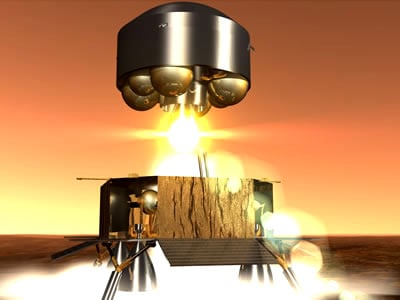Until humans can actually set foot on the Red Planet, the next best thing would be a sample return mission, to bring Martian soil samples back to Earth. A sample return would exponentially increase our knowledge and understanding Mars and its environment. And in order to pull off a mission of this magnitude, international cooperation might be required, and in fact, may be preferred. The International Mars Exploration Working Group (IMEWG), organized an international committee to study an international architecture for a Mars Sample Return (MSR) mission concept. After several months of collective work by scientists and engineers from several countries worldwide, the “iMARS†group is ready to publish the outcome of its deliberations and the envisioned common architecture for a future international MSR mission, and they will discuss their findings at an international conference on July 9 and 10 in France.
The conference will be held at the Auditorium of the Bibliothèque Nationale de France in Paris, and will bring together members of the scientific and industrial communities as well as representatives of space agencies around the world to discuss the status and prospects for Mars exploration over the coming decades. Attendees will have the opportunity to hear the current international thinking on Mars Sample Return and to interact with key players in the global endeavor of exploring and understanding Mars.
A Mars Sample Return mission would use robotic systems and a Mars ascent rocket to collect and send samples of Martian rocks, soils, and atmosphere to Earth for detailed chemical and physical analysis. Researchers on Earth could measure chemical and physical characteristics much more precisely than they could by via remote control. On Earth, they would have the flexibility to make changes as needed for intricate sample preparation, instrumentation, and analysis if they encountered unexpected results. In addition, for decades to come, the collected Mars rocks could yield new discoveries as future generations of researchers apply new technologies in studying them.
Keynote speakers at the upcoming conferencewill are Steve Squyres of Cornell University, principal investigator under the MER mission, and Jean-Pierre Bibring of the Institut d'Astrophysique Spatiale, principal investigator for a key instrument on Mars Express.
Interested in attending? Check out their
website
Original News Source:
ESA
 Universe Today
Universe Today
